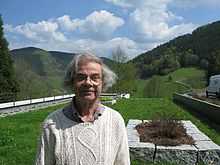Paul Monsky

Paul Monsky (born June 17, 1936) is an American mathematician and professor at Brandeis University.
After earning a Bachelors degree from Swarthmore College, he received his Ph. D. in 1962 from the University of Chicago under the supervision of Walter Bailey.[1] He has introduced the Monsky-Washnitzer cohomology and he has worked intensively on Hilbert-Kunz functions and Hilbert-Kunz multiplicity. In 2007, Monsky and Brenner gave an example showing that tight closure does not commute with localization.
Monsky's theorem, the statement that a square cannot be divided into an odd number of equal-area triangles, is named after Monsky, who published the first proof of it in 1970.[2]
In the mid-1970s, Monsky stopped paying U.S. federal income tax in protest against military spending. He resisted income tax withholding by claiming extra exemptions, and this led to a criminal conviction on tax charges in 1980.[3]
References
- ↑ Paul Monsky at the Mathematics Genealogy Project
- ↑ Aigner, Martin; Ziegler, Günter M. (2010), "One square and an odd number of triangles", Proofs from The Book (4th ed.), Berlin: Springer-Verlag, pp. 131–138, doi:10.1007/978-3-642-00856-6_20.
- ↑ “Professor to Face Trial In Antiwar Tax Protest” New York Times 10 March 1980, p. D8; Syre, Steven W. “More Individuals, Groups Refuse to Pay Taxes” (UPI dispatch as found in) The Bryan Times 10 April 1980, p. 12
External links
- Monsky's home page at Brandeis University
- Preprint on the example of Monsky and Brenner that tight closure does not commute with localization.
|